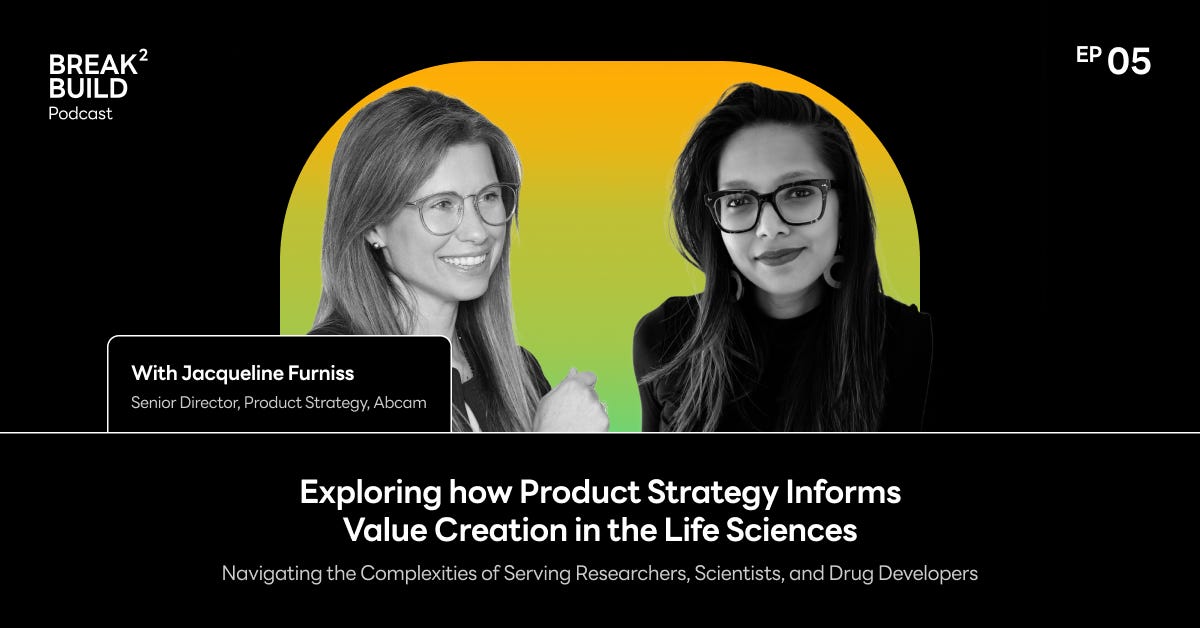Welcome to the latest episode of The Break to Build podcast! 🎉
I’m really excited to get this out in the world, but more importantly, hear from YOU.
✍️ Is this information useful?
🚀 Can you apply these insights to enhance product strategy, drive innovation, and optimize customer experiences in your organization?
🙋🏽♀️ Yes, or no, I’d love to hear your feedback on whether this episode resonated with you. Feel free to send me a DM on LinkedIn.
Okay enough promos, let’s dive in!
Who is Jacqueline Furniss?
Jacqueline Furniss is the Senior Director of Product Strategy at Abcam. Abcam is a leading global producer and supplier of protein research tools and reagents for life science research.
Jacqueline’s career journey is a fascinating non-linear path that began with a passion for genetic engineering, transitioned through significant roles in the dot-com boom with companies like DoubleClick, Excite, and E*TRADE, and eventually led her back to her roots in life sciences at Abcam. Her diverse background in both science and technology underpins her innovative approach to product strategy.
Who This Conversation Is For
Product Strategy Leaders
Data Strategists & Managers
Anyone interested in product innovation and value creation
Top Insights
Jacqueline’s non-linear career path: from genetic engineering to the dot-com boom and back to life sciences.
The importance of data-driven decision-making in aligning product strategy with customer needs.
How AI and generative AI are transforming product discovery and customer experiences in the life sciences sector.
The challenges of balancing customer feedback with internal innovation and maintaining a competitive edge.
The rising costs of research data processing and storage, and their implications for the industry.
What We Cover In This Episode
0:00:55 - Jacqueline’s career journey from genetic engineering to the dot-com world and back to life sciences.
0:04:47 - Overview of Abcam's focus on high-quality products and customer service.
0:05:11 - Addressing the diverse needs of Abcam’s audience: researchers, scientists, and drug developers.
0:09:14 - The importance of synergy between marketing, sales, and product teams.
0:10:17 - Is the customer always right? Balancing customer feedback with internal innovation.
0:13:32 - The impact of AI and generative AI on product strategy and customer experience.
0:21:13 - The critical role of first-party and zero-party data in the age of AI.
0:29:28 - The rising costs of research data processing and storage and their impact on the industry.
Get Curious With These Insights
Explore the potential of generative AI applications to analyze vast datasets.
Uncover hidden insights that can accelerate product discovery, identify opportunities for innovation, and optimize the customer experience throughout the product lifecycle.
Establish robust data collection and analysis frameworks to capture first-party and zero-party customer data.
This data can inform product roadmaps, feature prioritization, and ensure alignment with evolving customer demands.
Leverage data-driven insights to assess and prioritize product-related risks, such as regulatory compliance, safety concerns, and market dynamics.
Quantify these risks using advanced data analytics to allocate resources effectively and proactively address critical challenges, ensuring the highest standards of quality and safety for your products.
References/Resources
Connect with Jacqueline Furniss on LinkedIn
Check out Abcam’s Love Letters to Science.
A series of short films in which five scientists share the story of how they fell in love with science – and how it helped them find their collaborators, their people, and their community.
More about Chae O’Brien
I’m not interested in contributing to the digital noise our feeds get flooded with daily. If there are topics/trends you’d like me to cover or other areas of these conversations you’d like to dive deeper into, drop me a message via one of the below. I’m a research junkie, and nothing is more fun than finding answers to the doubted or unknown ✌🏼






